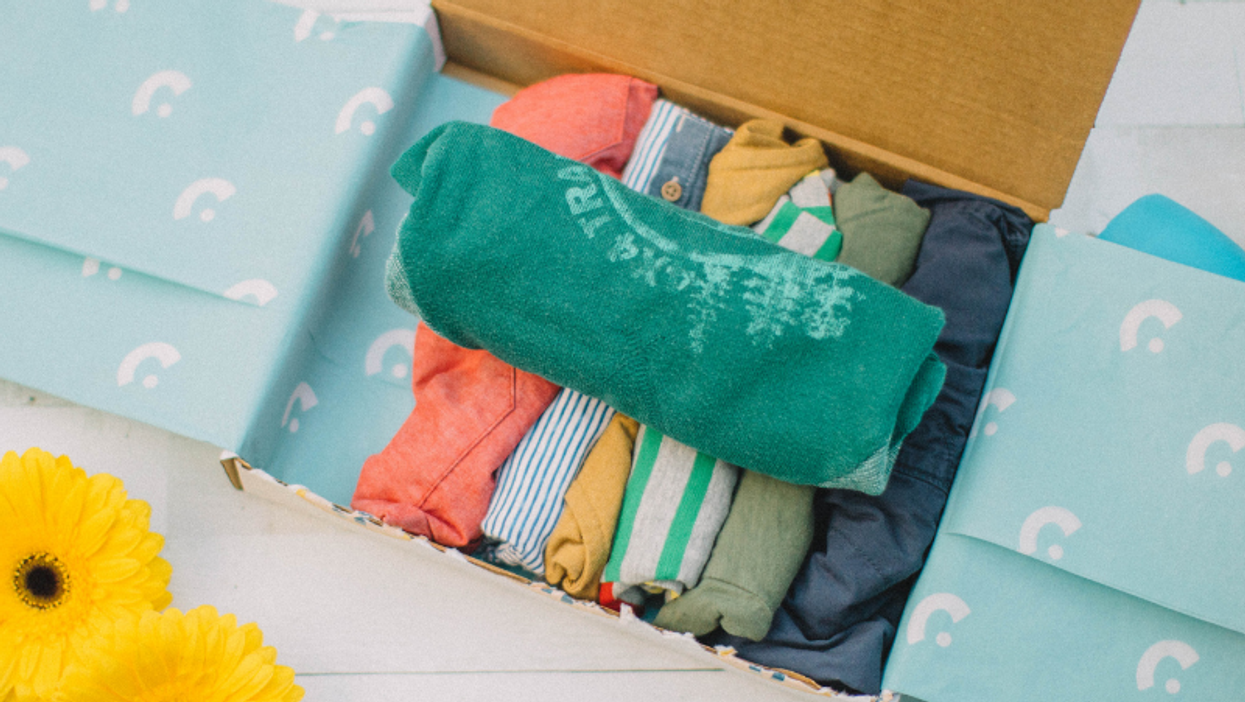Can This Kids’ Clothing Startup Help Tackle Fashion’s Sustainability Crisis?
Harri is dot.LA's senior finance reporter. She previously worked for Gizmodo, Fast Company, VentureBeat and Flipboard. Find her on Twitter and send tips on L.A. startups and venture capital to harrison@dot.la.

Rent-a-Romper, a kids clothing startup that launched to make "life easier for parents while reducing the burden of clothing on the planet," just made its first acquisition and raised a $150,000 angel round. The L.A.-based company plans to raise as much as $1.7 million more in the coming months, but can it make good on its goal of building "a more sustainable future for children's fashion?"
The five-person startup rents clothing to parents of fast-growing children, with the aim of cutting down both the time it takes to shop for apparel and the negative impact that disposable fashion has on the planet. Currently, Rent-a-Romper offers subscriptions that range from $9 to $63 per month.
The business recently snapped up San Francisco kids' clothing retailer ARLi in a cash and equity deal, enabling it to expand its inventory and — ideally — create a more environmentally friendly future for kids fashion.
Fashion's Role In Carbon Emissions
The fashion business is responsible for around 10% of global carbon emissions and is "widely believed to be the second most polluting industry in the world," according to the United Nations. Some have suggested clothing rental companies could be a sustainable alternative to fast fashion and a solution to fashion's disposability problem.
One recent study study — published in Finnish scientific journal Environmental Research Letters — is skeptical. It found that rentals can actually be worse for the planet, in part because of the high emissions generated by transportation and dry cleaning. The study's brutal takeaway: renting clothes can be "less green than throwing them away." Some businesses have contested that conclusion.
"Our focus, right now at the beginning, is on two key areas. The first one is extending the life of clothing as long as we possibly can," says founder and CEO Lauren Gregor. "And the second one is around diverting waste from landfills."
Rent-a-Romper tracks when clothing leaves its inventory and built its model anticipating that items could be rented out two or three times before they need to be retired. That turned out to be a conservative estimate, according to Gregor.
"We have items in our inventory that have now gone out to their sixth family and still have life in them," she says.] "And we're tracking which brands are more durable. We have over 150 brands in our inventory, so we're just gathering a ton of data."
To date, the company hasn't sent any of its clothes to landfills. Gregor pointed to partnerships the company has formed in Los Angeles to recycle textiles and donate clothes with life left in them. One such partner is South Gate-based Fybraa.
Rent-a-Romper also doesn't dry clean.
"We wash in cold water in high efficiency washing machines," says Gregor. And when items are stained, "We have a process where we'll soak it in natural, plant-based detergents and then we get it in the sun. Good thing about being in Southern California is we can do that, and it's one of the best ways to sanitize naturally."
But transportation, another culprit laid out in the study, is core to its business — and Rent-a-Romper's biggest expense.
"So we're really trying to be as creative as we can about bringing that cost down," says Gregor, who noted the company uses compostable mailers and recycled packaging.
Down the line, Gregor aims to open up regional centers to cut costs, speed up deliveries and reduce shipping emissions.
"We're small. We're a startup. So we're doing what we can, but [we are] very conscious about trying to make continuous improvements in those areas."
Providing Parents Another Option
Dr. Greys Sošić of the University of Southern California, whose research includes supply chain sustainability, wrote in an email to dot.LA that "renting kid's clothes could actually be beneficial for the environment" — with the caveat that she's not reviewed any hard data on Rent-a-Romper.
"I assume that moms, having other things to worry about, would not want to exchange kids' clothes every week or every two weeks," she said, "which are some of the 'fashion' rental terms, and would prefer to keep them for at least a month, or until their kid outgrows them. This reduces the biggest negative impact of apparel rental, which comes from clothes shipping and cleaning."
Without the option to rent, Sošić writes, "moms have to either regularly buy new clothes and dispose of the items that their kids have outgrown" or "rely on their personal network of friends and relatives who might have had kids before them and have some apparel that their kids cannot use anymore."
Rent-a-Romper plans to introduce new products this fall, expanding into seasonal and special occasion attire as well as one-time rentals. The startup may also grow its inventory to include apparel for older kids later on.
"We're really focusing on customer acquisition and perfecting our delivery as we bring ARLi in," says Gregor. "As we go out to raise this next round, the key things that we're going to be focusing on are our customer technology — as a circular business with massive variety in our inventory, technology is something that will be one of those levers that really help us scale."
Harri is dot.LA's senior finance reporter. She previously worked for Gizmodo, Fast Company, VentureBeat and Flipboard. Find her on Twitter and send tips on L.A. startups and venture capital to harrison@dot.la.



 Image Source: Revel
Image Source: Revel
